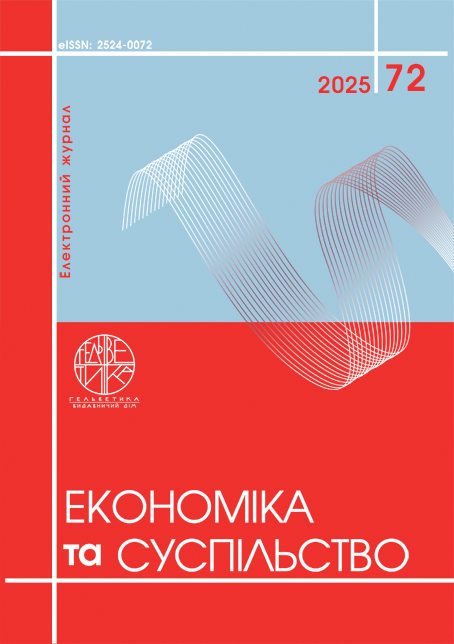GRADUAL DEVELOPMENT OF DISTRIBUTED PROJECT MANAGEMENT
Abstract
The article is devoted to the topical issues of distributed project management in the presence of favorable tools, reassessment of processes and procedures, and individual learning of new skills for distributed work. The development of technologies and needs for larger and more complex software systems is analyzed and systematized. It is outlined that for successful management of complex projects, project management practices must evolve to work in a distributed world, focusing simultaneously on people, processes and technology. Accessibility technology is explored to support the needs of distributed project management, despite the fact that incompatible data formats and data exchange remain a challenge. A vision of project management in the future is explored through this lens. The evolution to distributed project management drives the need for proven processes and methods. The project management discipline is certainly better today than it was 20 years ago. However, while companies have been responding to internal issues, customer behavior, industry structure and the competitive environment have begun to change externally at an accelerated pace. The net effect has been to expand the limits to which organizations can effectively manage projects in today's environment. This effect, combined with the increasing speed of technological change, makes it clear that current initiatives are not enough. Customers are increasingly focusing on improving the entire life cycle, especially in the early stages, and are taking a broader approach to evaluating ROI in terms of enterprise productivity. To work effectively, software engineering teams need at least a minimum number of face-to-face meetings. Project managers are looking for communication systems that combine data, voice, video, and virtual presence, and these tools are available today. Looking at management activities, which largely depend on communication skills, sociability, and focus, it is easy to understand why cultural changes in the areas of conflict behavior, processes, and technologies are necessary for adequate management of distributed work.
References
Atlassian. Scrum artifacts. Atlassian. URL: https://www.atlassian.com/agile/scrum/artifacts (дата звернення: 20.01.2025).
Van Steen, M., & Tanenbaum, A. S. Distributed systems (4th ed.). distributed-systems.net. URL:https://www.distributed-systems.net/index.php/books/ds4/ (дата звернення: 22.01.2025).
Forsgren, N., Humble, J., & Kim, G. Accelerate: The science of lean software and DevOps: Building and scaling high performing technology organizations. IT Revolution Press. URL: https://itrevolution.com/book/accelerate/ (дата звернення: 10.02.2025).
Mahmood, S., Anwer, S., Niazi, M., Alshayeb, M., & Richardson, I. Key factors that influence task allocation in global software development. Information and Software Technology, 91, 102–122. URL: https://doi.org/10.1016/j.infsof.2017.06.009 (дата звернення: 15.02.2025).
Aslam, W., & Ijaz, F. A quantitative framework for task allocation in distributed agile software development. IEEE Access, 6, 15380–15390. URL: https://doi.org/10.1109/ACCESS.2018.2812523 (дата звернення: 10.02.2025).
Stray, V., & Moe, N. B. Understanding coordination in global software engineering: A mixedmethods study on the use of meetings and Slack. Journal of Systems and Software, 170, 110717. URL: https://doi.org/10.1016/j.jss.2020.110717 (дата звернення: 03.03.2025).
Patel, R., Rudnick-Cohen, E., Azarm, S., Otte, M., Xu, H., & Herrmann, J. W. Decentralized task allocation in multi-agent systems using a decentralized genetic algorithm. Proceedings of the IEEE International Conference on Robotics and Automation (ICRA). URL: https://doi.org/10.1109/ICRA40945. 2020.9197314 (дата звернення: 05.03.2025).
Nundlall, C., & Nagowah, S. D. Task allocation and coordination in distributed agile software development: A systematic review. Journal of Software Engineering Research and Development, 13, 321– 330. URL: https://doi.org/10.1007/s40411-020-00130-0. (дата звернення: 05.03.2025).
Bick, S., Spohrer, K., Hoda, R., Scheerer, A., & Heinzl, A. Coordination challenges in large-scale software development: A case study of planning misalignment in hybrid settings. IEEE Transactions on Software Engineering, 44(10), 932–950. URL: https://doi.org/10.1109/TSE.2017.2730870. (дата звернення: 05.03.2025).
Atlassian. (n.d.). Scrum artifacts. Atlassian. [Scrum artifacts. Atlassian]. Available at: https://www.atlassian.com/agile/scrum/artifacts (accessed January 20, 2025)
Van Steen, M., & Tanenbaum, A. S. (2023). Distributed systems [Distributed systems]. (4th ed.). distributed-systems.net. Available at: https://www.distributed-systems.net/index.php/books/ds4/ (accessed January 22, 2025)
Forsgren, N., Humble, J., & Kim, G. (2018). Accelerate: The science of lean software and DevOps: Building and scaling high performing technology organizations. IT Revolution Press. [The science of lean software and DevOps: Building and scaling high performing technology organizations. IT Revolution Press]. Available at: https://itrevolution.com/ book/accelerate (accessed February 10, 2025)
Mahmood, S., Anwer, S., Niazi, M., Alshayeb, M., & Richardson, I. (2017). Key factors that influence task allocation in global software development. Information and Software Technology. [Key factors that influence task allocation in global software development. Information and Software Technology]. 91, 102–122. Available at: https://doi.org/10.1016/j.infsof.2017.06.009 (accessed February 15, 2025)
Aslam, W., & Ijaz, F. (2018). A quantitative framework for task allocation in distributed agile software development. [A quantitative framework for task allocation in distributed agile software development]. IEEE Access, 6, 15380–15390. Available at: https://doi.org/10.1109/ACCESS.2018.2812523 (accessed February 10, 2025)
Stray, V., & Moe, N. B. (2020). Understanding coordination in global software engineering: A mixedmethods study on the use of meetings and Slack. [Understanding coordination in global software engineering: A mixedmethods study on the use of meetings and Slack]. Journal of Systems and Software, 170, 110717. Available at: https://doi.org/10.1016/j.jss.2020.110717 (accessed March 03, 2025)
Patel, R., Rudnick-Cohen, E., Azarm, S., Otte, M., Xu, H., & Herrmann, J. W. (2020). Decentralized task allocation in multi-agent systems using a decentralized genetic algorithm. [Decentralized task allocation in multi-agent systems using a decentralized genetic algorithm]. Proceedings of the IEEE International Conference on Robotics and Automation (ICRA). Available at: https://doi.org/10.1109/ICRA40945. 2020.9197314 (accessed March 05, 2025)
Nundlall, C., & Nagowah, S. D. (2021). Task allocation and coordination in distributed agile software development: A systematic review. [Task allocation and coordination in distributed agile software development: A systematic review]. Journal of Software Engineering Research and Development, 13, 321– 330. Available at: https://doi.org/10.1007/s40411-020-00130-0 (accessed March 05, 2025)
Bick, S., Spohrer, K., Hoda, R., Scheerer, A., & Heinzl, A. (2018). Coordination challenges in large-scale software development: A case study of planning misalignment in hybrid settings. [Coordination challenges in large-scale software development: A case study of planning misalignment in hybrid settings]. IEEE Transactions on Software Engineering, 44(10), 932–950. Available at: https://doi.org/10.1109/TSE.2017.2730870 (accessed March 05, 2025)

This work is licensed under a Creative Commons Attribution 4.0 International License.


